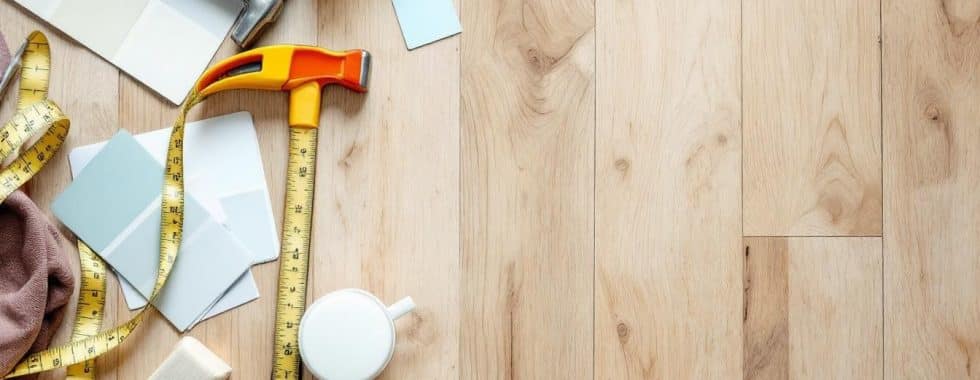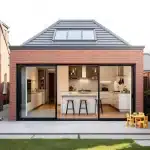How Much Does a Whole House Renovation Cost?
Renovating an entire house is a significant undertaking that can transform your living space. At Cameron Construction, we often get asked about the whole house renovation cost.
The truth is, there’s no one-size-fits-all answer. Costs can vary widely based on factors like the size of your home, the scope of work, and your location.
In this post, we’ll break down the key elements that influence renovation costs and provide practical tips to help you budget effectively.
What Drives Whole House Renovation Costs?
Size and Age: The Foundation of Costs
The size of your home significantly impacts renovation costs. Larger homes require more materials and labour, which increases overall expenses. According to HiPages, ground floor extensions cost per m2 in Australia are between $2,000-$4,000.
Age also plays a vital role. Older homes often conceal surprises behind walls and under floors. Renovating a 1920s bungalow can cost 30% more than a similar-sized 1990s home due to necessary upgrades in wiring, plumbing, and structural reinforcements.
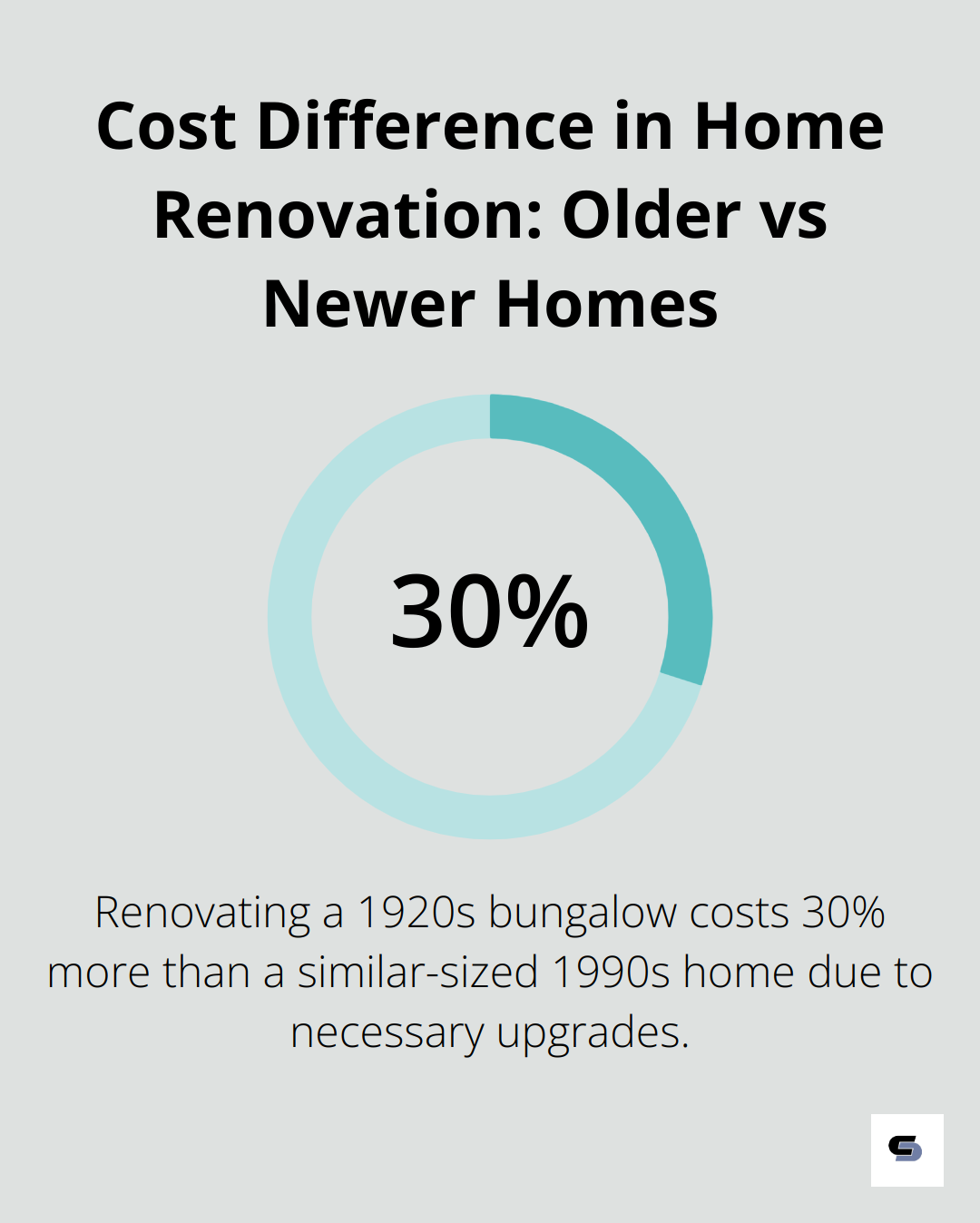
Scope and Quality: Defining Your Vision
The extent of your renovation dramatically affects costs. A simple refresh with new paint and fixtures differs vastly from a complete gut and rebuild. A basic kitchen remodel alone can range from $15,000 to $50,000, while a high-end renovation with custom cabinetry and top-of-the-line appliances can easily exceed $50,000.
Material quality is another significant factor. Opting for premium finishes like marble benchtops or hardwood flooring can increase costs by 20-30% compared to mid-range alternatives. However, these choices often result in better longevity and higher resale value.
Location and Labour: The Hidden Cost Drivers
Your location greatly influences renovation costs. Urban areas like Melbourne typically have higher labour rates than rural regions. Projects in central Melbourne can cost up to 20% more than similar renovations in outer suburbs due to labour and permit costs.
Structural changes often become the most expensive aspect of whole house renovations. Moving load-bearing walls or adding extensions can quickly escalate costs. Adding a second storey to a single-level home can increase the project budget by 50% or more.
Critical Systems: The Unseen Investments
While it’s tempting to focus on the visible aspects of renovation, don’t overlook critical systems. Updating electrical, plumbing, and HVAC systems might not appear glamorous, but they’re essential for a safe, efficient home. House renovation costs depend on factors like project size, materials, labour, and location. By understanding these variables, you can simplify budgeting.
Understanding these cost factors allows you to make informed decisions about your renovation project. A detailed assessment (provided by experienced professionals) helps balance your vision with your budget, ensuring a successful whole house renovation that adds value to your home and enhances your living experience.
Now that we’ve explored the main cost drivers, let’s break down the average costs for specific areas of a whole house renovation.
What Does a Whole House Renovation Really Cost?
Kitchen: The Heart of Your Home
Kitchen renovations often consume a large portion of the budget. With costs ranging from $22,000 to $45,000, you can expect to see significant improvements in both functionality and aesthetics. Mid-range renovations can include custom cabinetry and quality appliances. The cost varies based on the kitchen’s size, material quality, and design complexity. Moving plumbing or electrical points adds significantly to the cost.
Bathrooms: Small Spaces, Big Impact
Bathroom renovations typically cost between $15,000 and $30,000 (covering basic updates to mid-range renovations). Luxury bathroom renovations can cost upwards of $40,000. Tiles usually represent the largest expense in a bathroom renovation, both for the product and installation. To reduce costs, consider maintaining the existing bathroom layout to minimise plumbing expenses.
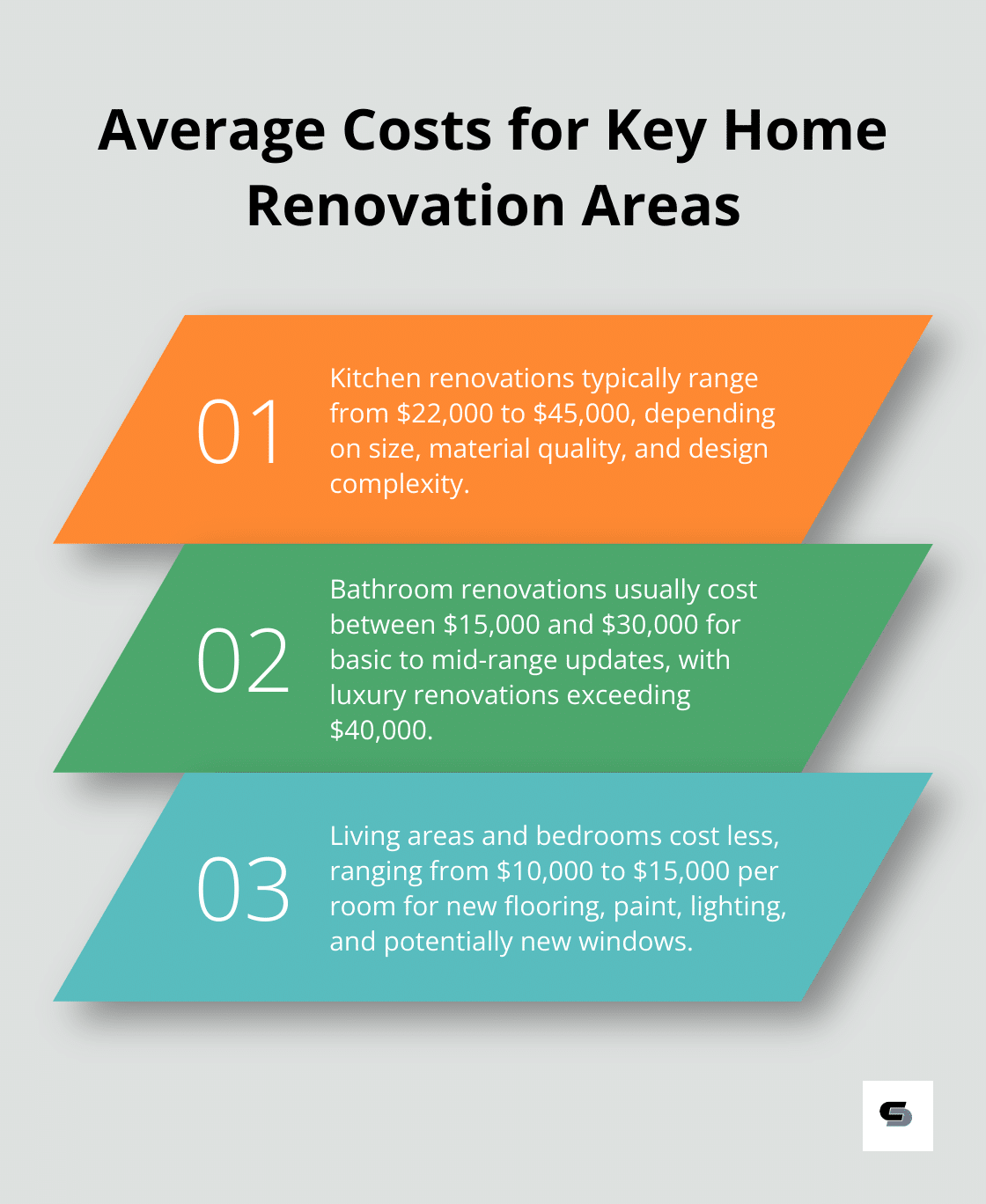
Living Areas and Bedrooms: Refreshing Your Space
Renovating living areas and bedrooms costs less than kitchens and bathrooms. Prices range from $10,000 to $15,000 per room, focusing on new flooring, paint, lighting, and potentially new windows. Structural changes (like removing walls for an open-plan living area) increase costs significantly.
Exterior Renovations: Curb Appeal Matters
Exterior renovation costs vary widely. A fresh coat of paint costs $5,000 to $15,000 for an average-sized home. More extensive work like re-roofing ranges from $20,000 to $40,000. Replacing windows typically costs between $800 and $2,500 per window, while landscaping projects can range from $5,000 to $25,000 or more.
Electrical and Plumbing: The Hidden Costs
Updating electrical and plumbing systems (often necessary in older homes) represents a significant expense. Rewiring an entire house costs between $8,000 and $15,000, while replumbing ranges from $5,000 to $12,000. These costs increase if walls need opening or if the home’s layout proves complex.
These figures represent averages and can vary based on factors like your home’s age and condition, location, and specific project requirements. To ensure accurate budgeting, always obtain a detailed, personalised quote for your specific renovation project.
Now that we’ve explored the costs associated with different areas of a whole house renovation, let’s look at some strategies to save money without compromising on quality.
How to Cut Costs on Your Whole House Renovation
Focus on High-Impact Areas
Renovating an entire house can strain your budget, but smart strategies can reduce costs without sacrificing quality. Prioritise areas that offer the most value for your investment. Kitchens and bathrooms typically provide the highest return on investment. A minor kitchen remodel can recoup about 81% of its cost in increased home value (according to Remodeling Magazine’s Cost vs. Value Report). Concentrate on these spaces to improve your home’s functionality and value significantly without overspending.
Combine DIY with Professional Work
While some tasks require expert skills, many aspects of a whole house renovation present DIY opportunities. You can save thousands in labour costs by painting walls, installing baseboards, or laying tile yourself. However, it’s crucial to assess your abilities realistically. Attempting complex electrical or plumbing work without proper knowledge can result in costly mistakes and safety hazards. We at Cameron Construction can advise you on which tasks suit DIY and which need professional handling.
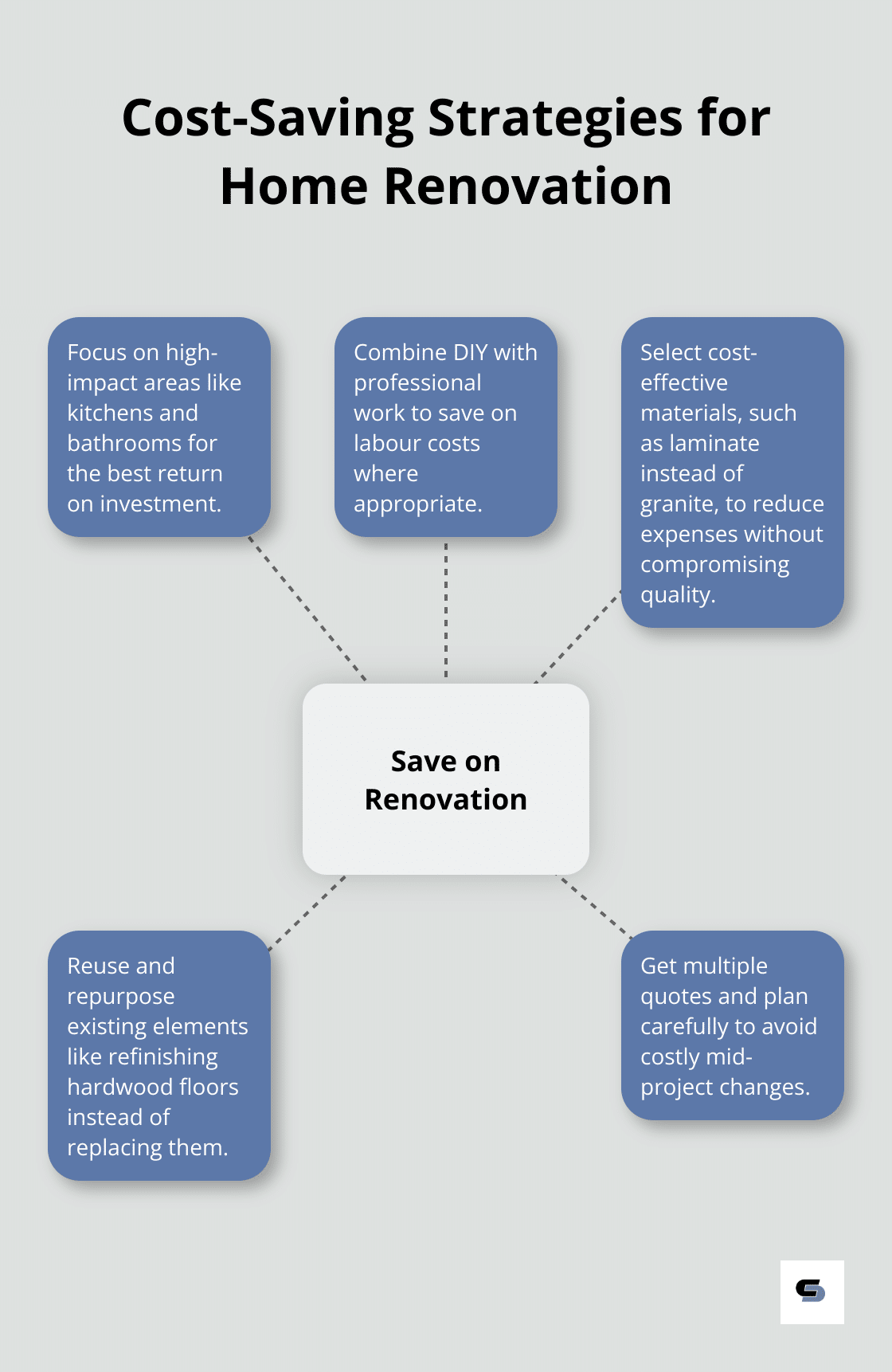
Select Cost-Effective Materials
Wise material choices can lead to substantial savings. For instance, using laminate benchtops instead of granite can reduce kitchen renovation costs by $2,000 to $5,000. Look for clearance sales or overstock items from local suppliers. Some homeowners have saved up to 80% on high-end appliances by purchasing floor models or last year’s stock. Additionally, consider getting a Home Depot credit card for potential rebates and 0% interest offers on purchases. Cost-effective doesn’t equate to low quality; many modern laminate flooring options offer durability and aesthetics comparable to hardwood at a fraction of the cost.
Reuse and Repurpose Existing Elements
Before completely gutting your house, consider what you can salvage or repurpose. Refinishing existing hardwood floors instead of replacing them can save you $4 to $5 per square foot. Similarly, painting or refacing kitchen cabinets instead of full replacement can reduce kitchen renovation costs by 30-50%. This approach not only saves money but also preserves your home’s unique character.
Get Multiple Quotes and Plan Carefully
Obtain quotes from several contractors to ensure competitive pricing. A detailed plan helps avoid costly mid-project changes. Try to account for potential issues (such as outdated wiring or plumbing) in your initial budget. This foresight can prevent unexpected expenses that often derail renovation budgets.
Final Thoughts
Whole house renovation costs vary based on factors like home size, age, project scope, and location. We at Cameron Construction provide detailed quotes and expert guidance to align your renovation with your vision and budget. Our team of professionals works closely with you to maximise the value of your investment.
Whole house renovations offer significant long-term value by enhancing your living experience and increasing property market value. You can achieve remarkable results while managing costs effectively through smart strategies such as prioritising high-impact areas and choosing cost-effective materials. Professional assessment proves essential for accurate cost estimation and project planning.
Cameron Construction brings over 40 years of experience in Melbourne’s home renovation industry. We commit to delivering quality craftsmanship and customer satisfaction (completing projects on time and within budget). Our expertise transforms your house into the home you’ve always envisioned.

